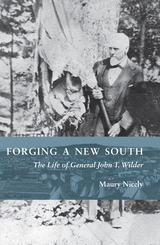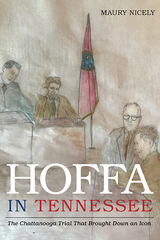
It is the comprehensive picture of Wilder’s nearly nine decades that Maury Nicely seeks to capture in Forging a New South: The Life of General John T. Wilder. “For many war heroes, there was not much beyond the war worth telling,” Nicely writes. “Such was not the case with Wilder.” A successful entrepreneur and industrialist, after the war Wilder relocated to East Tennessee, where he created dozens of businesses, factories, mines, hotels, and towns; was elected mayor of the city he had shelled during the war; and cultivated close personal and business relationships with Federal and Confederate veterans alike, helping to create a new South in the wake of a devastating conflict. Presented in two parts and accompanied by more than sixty detailed photographs and maps, Nicely’s balanced study fills a significant void—the first complete biography of General John T. Wilder.

By the early 1960s, Jimmy Hoffa had a stranglehold on the presidency of the Teamsters Union. However, his nemesis, Attorney General Robert F. Kennedy, was convinced that Hoffa was a corrupt force whose heavy-handed influence over the union threatened the nation. As Attorney General, Kennedy established a “Get Hoffa Squad” that set out to unearth criminal wrongdoing by the labor leader in order to remove him from power. A number of criminal trials in the 1950s and early 1960s resulted in not-guilty verdicts for Hoffa. Matters would finally come to head in Chattanooga, Tennessee, in a climatic, but often overlooked, historical moment chronicled by Maury Nicely in this engrossing book.
After a Christmastime 1962 acquittal in Nashville of charges that Hoffa had illegally received funds from a trucking company in exchange for settling a costly strike, it was discovered that several attempts had been made to bribe jurors. Fresh charges of jury tampering in that case were quickly filed against Hoffa and five others. Moved to Chattanooga, the new trial was held before a young, relatively untested federal judge named Frank Wilson. The six-week courtroom conflict would devolve into a virtual slugfest in which the defense team felt was necessary to turn its ire against Wilson, hoping to provoke an error and cause a mistrial. As Nicely shows in vivid detail, Hoffa’s Chattanooga trial became the story of a lone, embattled judge struggling mightily to control a legal proceeding that teetered on the edge of bedlam, threatening to spin out of control. In the end, Hoffa was convicted-an extraordinary change of fortune that presaged his downfall and mysterious disappearance a decade later.
In examining how justice prevailed in the face of a battering assault on the judicial system, Hoffa in Tennessee demonstrates how a Chattanooga courtroom became a crucial tipping point in Jimmy Hoffa’s career, the beginning of the end for a man long perceived as indomitable.
READERS
Browse our collection.
PUBLISHERS
See BiblioVault's publisher services.
STUDENT SERVICES
Files for college accessibility offices.
UChicago Accessibility Resources
home | accessibility | search | about | contact us
BiblioVault ® 2001 - 2024
The University of Chicago Press









